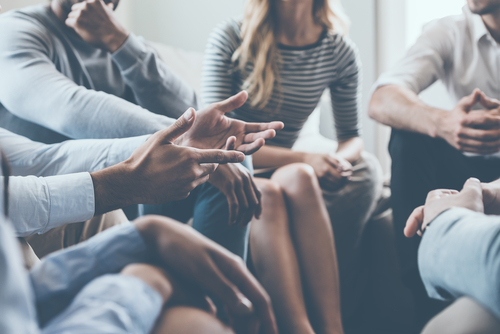
If you’re struggling with thoughts of suicide, PLEASE call the National Suicide Prevention Lifeline: 1-800-273-TALK (8255).
It’s becoming more and more common to find real-life, difficult examples of addiction right in our families and communities. Young people, whom we want to protect and shield from these painful realities, are coming face to face with them in their schools, in their friend groups, and in their neighborhoods. We might be tempted as parents and caregivers to hold off on talking about addiction until they’re older. We don’t want to influence them negatively and steer them down a path of experimenting with drugs or addictive behaviors. We don’t want them to be negatively impacted by the peer pressure they might be experiencing. We don’t want them to be corrupted by the suffering of addicts they’re witnessing around them. We can help our young people understand addiction without normalizing or glamorizing it, as popular culture often does, and without making them think it’s a suitable or acceptable path for them simply because it’s so common and widespread. We can give them information and guidance and help them make educated, informed choices for their own well-being.
We want to convey to young people that addiction is often a response to deep mental and emotional pain, a coping mechanism for unhealed suffering. We want to impress upon them that not only do addictive substances and behaviors fail to heal or take away our pain, rather they compound it and make it considerably worse. They add layers of trauma to our existing traumatic experiences, many of which we have yet to make peace with. They keep us distracted, zoned out and constantly seeking escape. They keep us from being in touch with our emotions so that we can really heal them. They keep us from being connected to ourselves and others. When young people understand this concept of addiction as a coping mechanism, they can start to see that there isn’t anything fun, exciting or glamorous about drugs, as is often portrayed in popular media, and they’re not lighthearted means of being adventurous or spontaneous, as their peers might have them believe.
We can educate our young people on the after-effects of experimenting with drugs and becoming dependent upon them – depression, anxiety, panic attacks, insomnia, and suicidal tendencies. We can educate them on the disastrous impact that addiction can have on our lives, from robbing us of our careers and passions to causing us to lose our families, our homes, our financial stability, and our peace of mind. We can show them that there’s much more to drug use than the euphoria of feeling high, there is also the crash and burn that inevitably comes after. We can help them understand just how crucial it is that they learn to love and value themselves, so that self-destructiveness as a way of life doesn’t take root in their hearts and minds. We can help them develop healthy coping skills and find productive outlets for their pain. We can guide them in navigating life’s challenges with courage rather than avoidance and escapism.
At The Guest House Ocala, we have personal recovery experience and over 12 years in the recovery industry. We have helped countless people recover, and we’re here to help you too. Call 855-483-7800 today for more information.